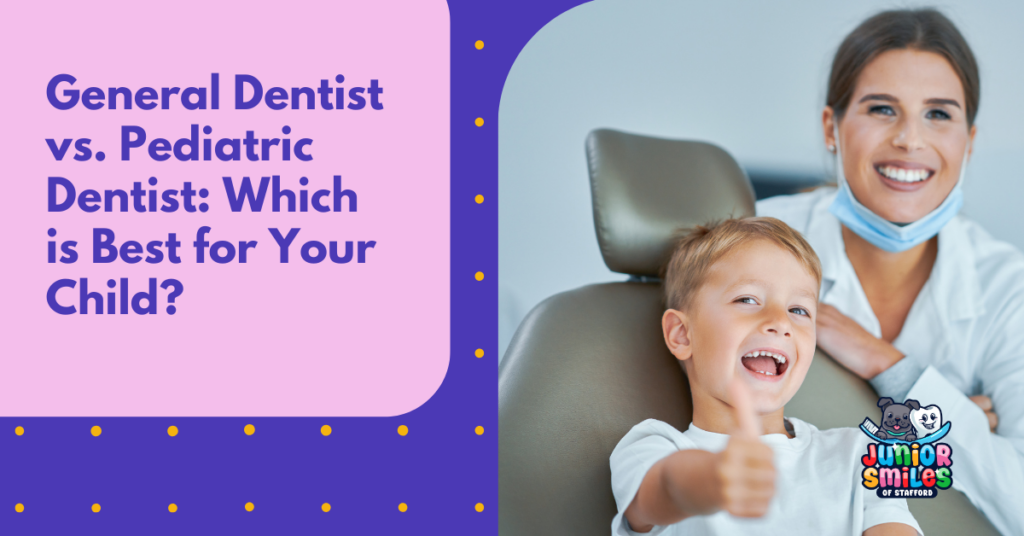General Dentist vs. Pediatric Dentist: Which is Best for Your Child?

One of your most important responsibilities as a parent is ensuring your child’s health — and that includes their oral health. From their first tooth to their teenage years, regular dental checkups play a vital role in maintaining a healthy smile and preventing future dental issues. But with so many options available, one common question parents ask is: Should my child see a general dentist or a pediatric dentist?
This article dives deep into the differences between general and pediatric dentists, their qualifications, approaches to child care, and how to decide which one is best for your child.
Understanding the Basics
What is a General Dentist?
A general dentist is a dental professional who diagnoses, treats, and manages overall oral health care needs for patients of all ages. They are often referred to as “family dentists” because they treat both children and adults.
Education and Training:
- Typically completes a bachelor’s degree followed by a four-year Doctor of Dental Surgery (DDS) or Doctor of Dental Medicine (DMD) program.
- Receives training in various dental procedures including cleanings, fillings, crowns, bridges, root canals, and extractions.
- May take some additional courses in child dentistry, but not to the extent of a pediatric specialist.
What is a Pediatric Dentist?
A pediatric dentist, also known as a pedodontist, specializes in the oral health of infants, children, and adolescents — including those with special health needs.
Education and Training:
- Completes the same education as a general dentist (DDS or DMD).
- Undergoes an additional 2-3 years of specialized training focused solely on treating children’s teeth, behavior, physical growth, and development.
- Trained in child psychology, sedation dentistry for children, and handling special needs patients.
Key Differences Between General and Pediatric Dentists
| Aspect | General Dentist | Pediatric Dentist |
| Age Range | All ages | Infants to teens (up to age 18) |
| Specialized Training | General dental procedures | Child psychology, pediatric care, sedation |
| Office Environment | Standard dental office | Child-friendly with toys, colors, and entertainment |
| Behavioral Techniques | Basic | Advanced (tell-show-do, distraction, positive reinforcement) |
| Complex Pediatric Cases | May refer to a specialist | Equipped and trained to handle them |
| Use of Sedation | Limited knowledge | Trained in child-safe sedation techniques |
Advantages of Choosing a Pediatric Dentist
1. Child-Friendly Environment
Pediatric dental offices are designed with kids in mind. From the brightly colored walls and cartoon murals to waiting rooms filled with toys, books, or video games, everything is tailored to create a positive and stress-free experience.
2. Specialized Expertise
Pediatric dentists are experts in managing baby teeth, guiding oral development, and handling specific childhood conditions like:
- Thumb-sucking
- Pacifier dependency
- Teething concerns
- Early childhood cavities
- Tongue-tie or lip-tie conditions
Their additional training also prepares them to manage children with developmental delays or medical conditions like autism or ADHD.
3. Behavior Management
Young children may be fearful or anxious about visiting the dentist. Pediatric dentists use behavior guidance techniques, including:
- Tell-Show-Do method
- Voice control
- Modeling and positive reinforcement
- Parental involvement techniques
They are more experienced in calming nervous children and making dental visits feel safe and even fun.
4. Preventive and Developmental Focus
Pediatric dentists focus heavily on preventive care, helping children develop healthy oral habits early on. They monitor oral development and can detect early signs of issues such as malocclusion, speech problems, or dental caries.
When a General Dentist May Be a Good Choice
While pediatric dentists offer specialized care, general dentists can still be a great choice for some families.
1. Convenience for the Whole Family
Many families appreciate having a “one-stop-shop” where both children and adults can receive care. This simplifies scheduling and reduces the need for multiple appointments at different offices.
2. Familiarity and Trust
If your family has been seeing a general dentist for years and your child feels comfortable there, it may be worth continuing care — especially if the dentist has experience with children.
3. Older Children and Teens
For older kids (around 12 years and up) who are more cooperative and less anxious, a general dentist might suffice for routine check-ups, cleanings, and minor procedures.
4. Emergency Care or Availability
In cases where a pediatric dentist isn’t available nearby or in emergency situations, a general dentist can provide essential care until a pediatric specialist is accessible.
Factors to Consider When Choosing a Dentist for Your Child
1. Your Child’s Age and Temperament
Is your child easily frightened, anxious, or highly active? If yes, a pediatric dentist with child behavior training may be better equipped to provide care. Younger children (under age 6) typically benefit more from the environment and expertise of pediatric dentists.
2. Type of Dental Work Needed
For complex procedures such as crowns, extractions, or treatment of severe decay, pediatric dentists are more likely to have the appropriate tools, techniques, and sedation methods.
3. Accessibility and Location
Consider how far you’re willing to travel and how often appointments will be needed. If a pediatric dentist is located far away and your child only needs routine cleanings, a general dentist nearby might be more practical.
4. Your Child’s Medical or Special Needs
Children with developmental, behavioral, or medical conditions benefit greatly from the specialized training of pediatric dentists, who are more experienced in treating children with sensory issues, anxiety, and special health concerns.
5. Insurance and Cost
Pediatric dental care may be more expensive, and not all insurance plans cover visits to pediatric specialists. It’s important to verify what your dental insurance includes before making a decision.
Transitioning from Pediatric to General Dentistry
Most children visit a pediatric dentist until they reach their teenage years or early adulthood. Around ages 16–18, many transition to a general dentist for continued care. Signs it might be time to switch:
- Wisdom teeth start to erupt (requires general dentist or oral surgeon)
- Child becomes more comfortable with routine dental procedures
- Aging out of pediatric services
Some pediatric practices even assist in the referral and transition process, ensuring continuity of care.
What Dentists Themselves Recommend
Interestingly, many general dentists refer patients to pediatric dentists when:
- A child is extremely anxious or uncooperative
- The child requires specialized procedures
- Parents express concern about oral development
- There are complications with baby teeth or eruption patterns
Likewise, pediatric dentists often collaborate with general and orthodontic professionals when a broader treatment plan is needed.
Real-World Scenarios
Let’s explore a few examples to illustrate the choice between general and pediatric dentists:
Scenario 1: The Toddler’s First Visit Your 2-year-old is scheduled for their first dental checkup. They’re shy, easily frightened by strangers, and still use a pacifier.
Best choice: Pediatric dentist — they’re trained in easing first-visit anxiety, pacifier-related concerns, and early childhood oral development.
Scenario 2: The Busy Family with Older Kids You have three kids aged 7, 10, and 15. Your family already sees a general dentist who is gentle and experienced with children.
Best choice: General dentist — convenient and cost-effective, especially if your children are comfortable and haven’t had dental issues.
Scenario 3: Child with Autism Your 5-year-old is on the autism spectrum and has sensory processing difficulties.
Best choice: Pediatric dentist — their training includes behavioral guidance and managing special needs children.
Scenario 4: Teen with a Cavity Your 14-year-old needs a cavity filled. They’re calm and cooperative during dental visits.
Best choice: General dentist — they can handle routine fillings without specialized care.
Final Verdict: Which is Best for Your Child?
There’s no universal answer — the best choice depends on your child’s needs, age, temperament, and dental history. In general:
- Pediatric dentists are ideal for younger children, anxious patients, or those with complex or special needs.
- General dentists are suitable for routine care, older children, or when convenience and family-wide treatment are priorities.
When in doubt, consider visiting both types for an initial consultation. You can evaluate the office environment, the dentist’s demeanor with your child, and the level of care provided before making a decision.
Conclusion
Choosing the right dentist is a critical step in your child’s lifelong oral health journey. Whether you opt for a general or pediatric dentist, what matters most is finding someone who understands your child’s unique needs and can make dental visits a positive experience.
Start early, prioritize preventive care, and don’t hesitate to ask questions. A healthy smile starts with the right dental partner — and your child deserves nothing less.

